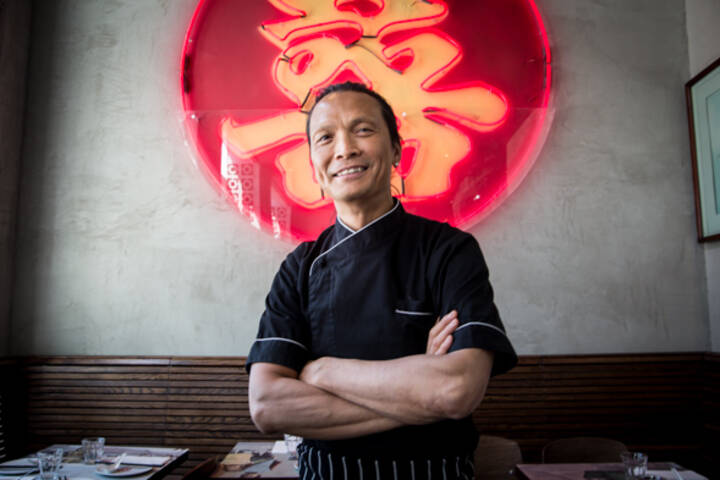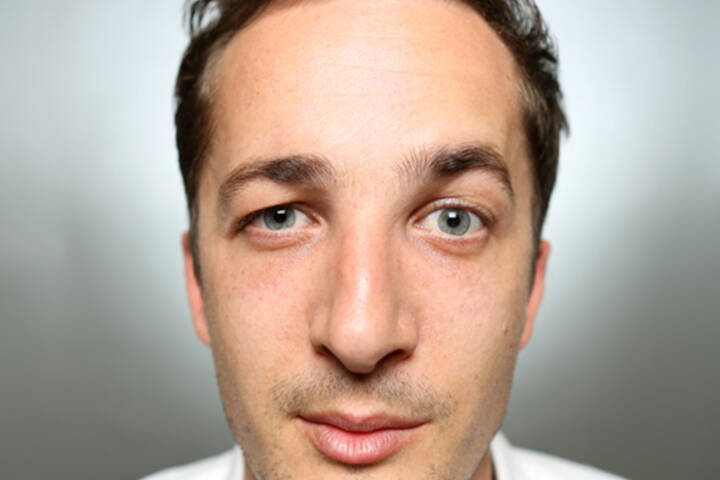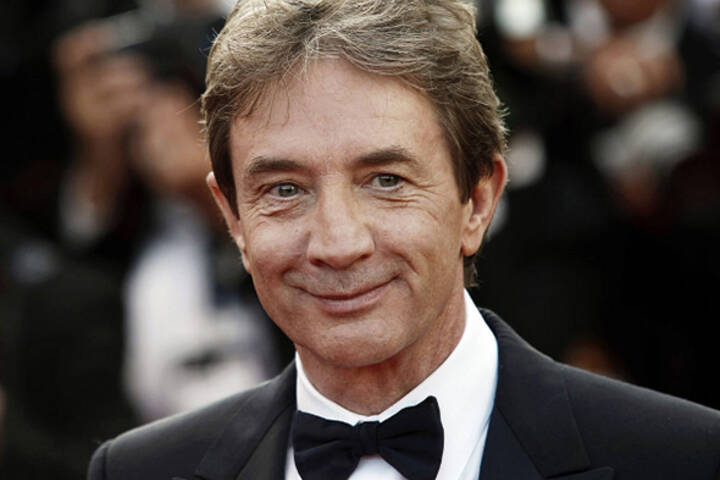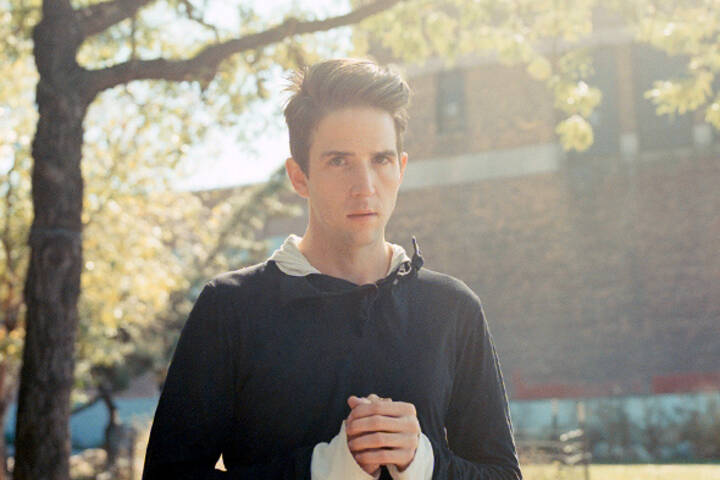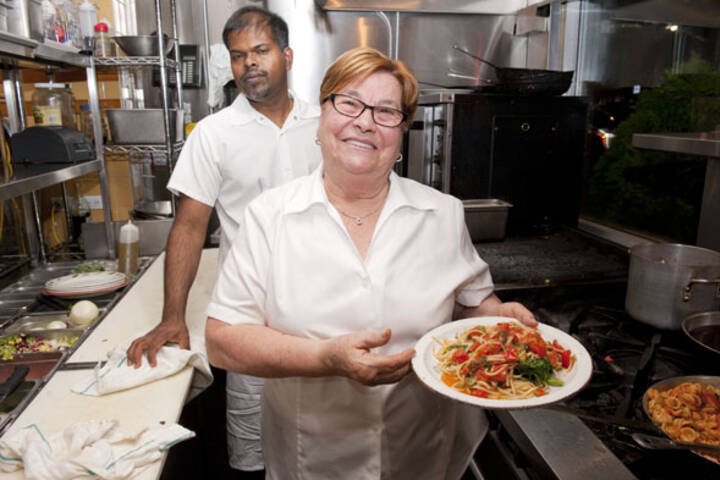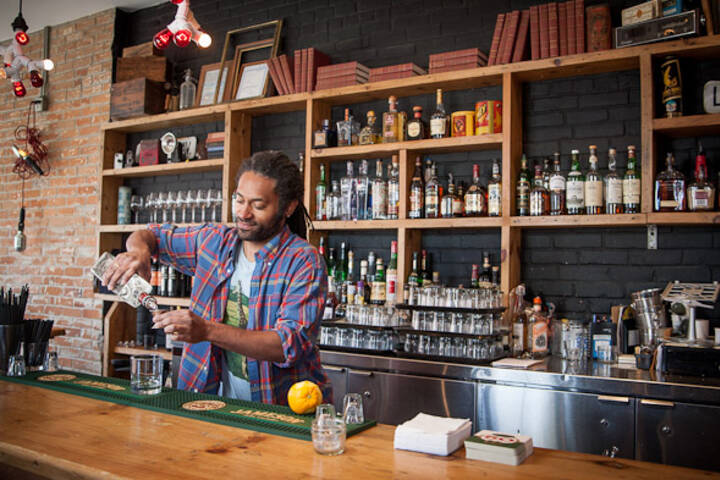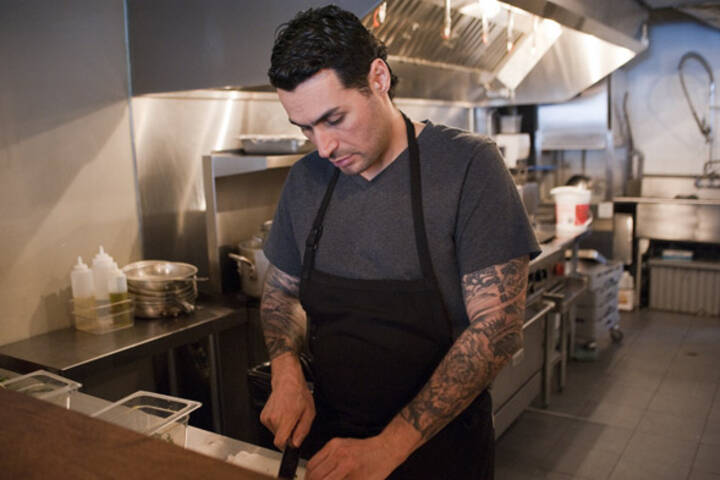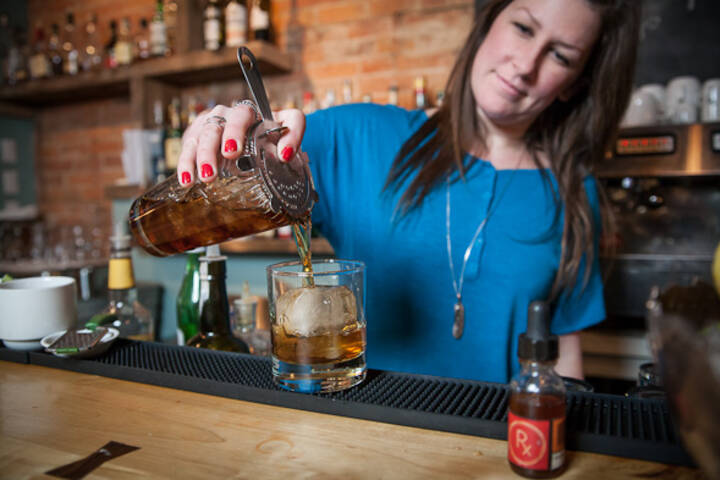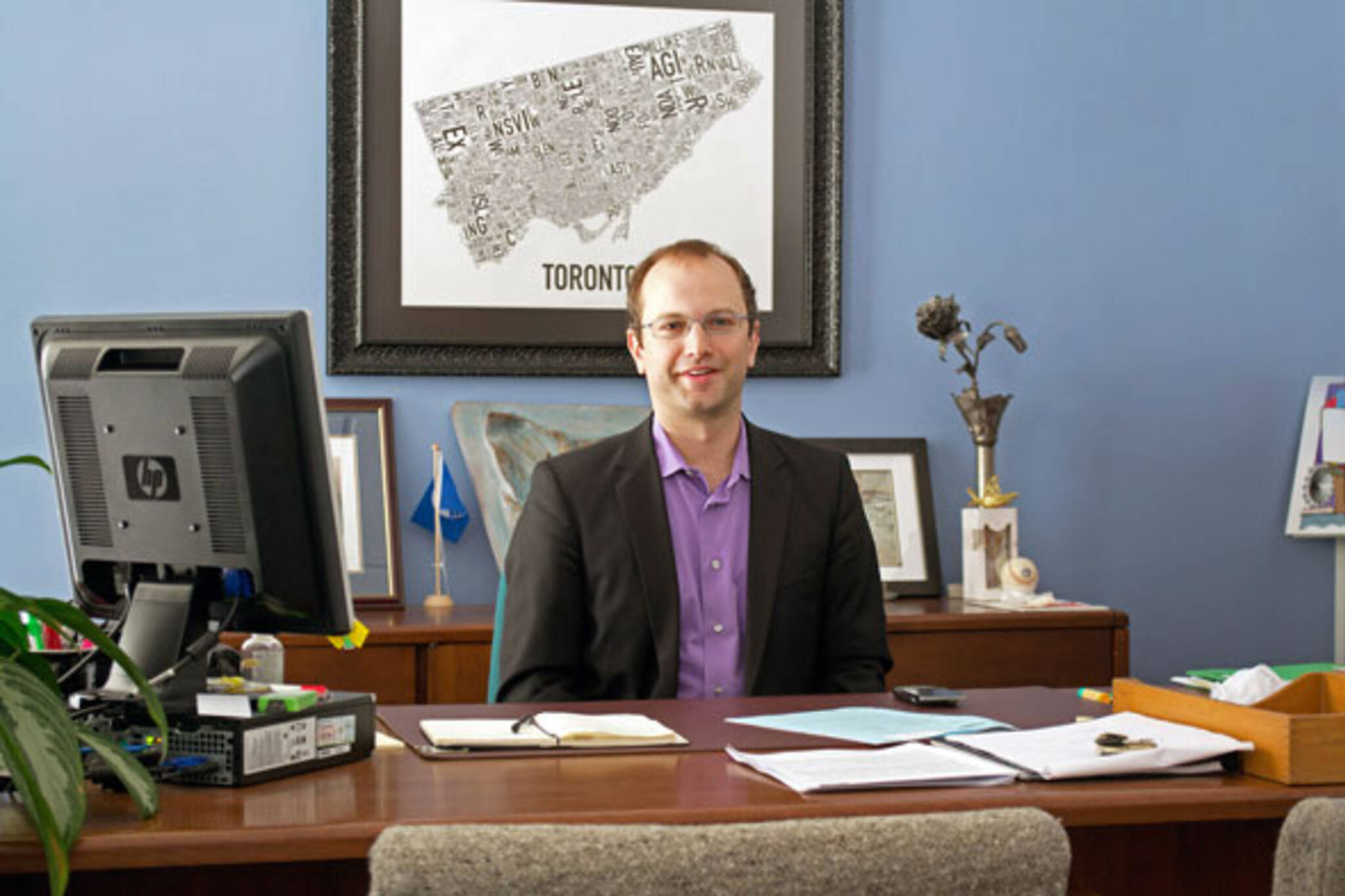
Toronto through the eyes of Mike Layton
Mike Layton, like many Toronto city councillors, runs on a busy schedule. Serving as the councillor of Ward 19 since 2010, he doesn't shy away from the fact that his politics are similar to his late father's, but he's proven through media scrums and council meetings that he also has a distinct set of skills to bring to the table that sets him apart from his lineage.
I caught up with Layton to get his thoughts on public transit, cycling infrastructure and the nature of his relationship with Rob Ford.
What is an average day like for you?
Most days I start my meetings around 8 a.m. or 9 a.m., either in the ward or in my office. I normally have the opportunity before or after those meetings to touch base with my executive assistant about anything pressing for the day. We have a multitude of whiteboards in the office to keep track of priorities and dates. I try and do the day in one hour chunks, so that leaves me with a half an hour to actually put into action anything that happened at the meeting.
I normally have a little bit of time around lunch to reserve for the gym. After that I have a bite to eat at my desk while responding to phone calls. Typically the afternoon goes the same as my morning. My day is normally free between 5 p.m. and 6 p.m., and around 6 p.m. or 7 p.m. a community meeting starts.
That's a typical day without a council meeting. If there's a council meeting, I'm obviously in the council chamber on the computer either researching what questions I'm going to ask or what I'm going to say or trying to draft motions.
You've lived in Toronto your whole life. What do you think has changed for the better about the city over the last 10 years?
It seems like the city has become more integrated rather than a collection of distinct communities. Our communities are really starting to come together. There's a lot more sharing of our common culture going on in Toronto. You see that when you're out at the Korean Dano Spring Festival in Christie Pits. You see it in the diversity of the crowd. It's not only the Korean families celebrating springtime; it's families from every background. It's very reflective of Toronto's character, and I think that has just developed over time. It's a common and shared understanding and a desire to look beyond our individual cultures. That's something I don't remember when growing up.
What remains Toronto's worst quality?
Like our wider society, while people are sharing in each other's culture more and more, there's been a distinct tendency — particularly in the past couple of years — for people to looking out for themselves. We hear that in the political jargon, all the way from the rhetoric of the federal government to the so-called gravy train.
The idea that paying taxes is a "bad thing" — and don't get me wrong, none of us like paying our taxes — but the things they give us are incredibly good things for the most part. The central function of government is that it serves, and much of that, unfortunately, has been eroded away. We collect taxes to make society work. We collect taxes to help create wealth for businesses. Businesses wouldn't function on their own. It just doesn't work that way.
It ultimately gets back to the idea that individuals are all in it for themselves. I think it's partly false...because when you start having a dialogue with people about what they want society to be, they instinctively go the opposite way. They want a caring and nurturing society. But the dialogue we get, politically, it's distinctively the opposite. It's don't trust the government.
And that's frustrating because when you are trying to build a city that is a caring city, one that looks out for all its citizens, it's increasingly difficult when you are up against the false idea that private business does it better.
How do you over come that challenge?
I think it has to do with dialogue and conversation, rather than catchphrases and policies made up on the back of the napkin. Sure, good policies can start on the back of a napkin, but it shouldn't be introduced that way. It should start as an idea. It needs to start as a dialogue about what type of city we want to live in.
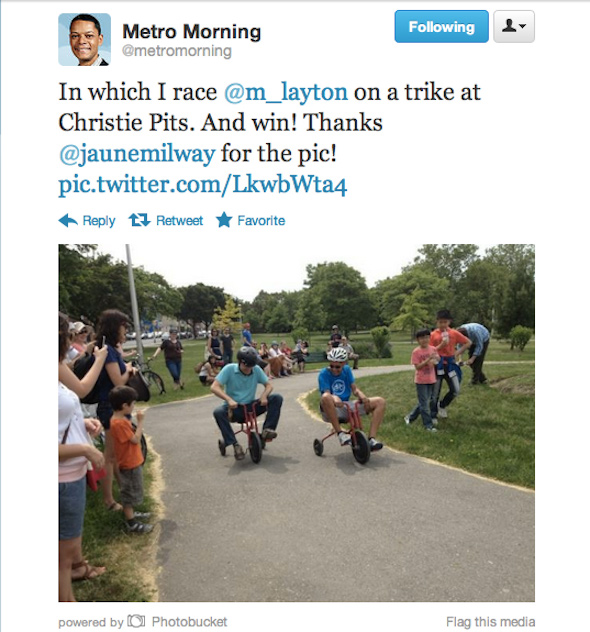
How do you get around the city?
I cycle, almost exclusively. I take the streetcar when it is rainy or snowy. I don't trust other drivers on the road.
Do you think Toronto is a safe place to commute on your bicycle?
I grew up cycling on city streets...since I was 11 years old. There's plenty more bike lanes now than there was then.
But, there are a lot of improvements we can make. I'm fortunate enough that I can ride a bike lane almost all the way to work. I think once they finish the Bay lane, I will have a bike lane for all but two blocks on my way to work.
Most of what I think needs to happen is education about it. I think drivers and cyclists need to find a new way of sharing the road in which both groups actually follow the rules. I think it's building that common understanding that's going to be the long term solution because we are never going to get bike infrastructure on every road.
We have a long way to go, but I feel pretty comfortable out there riding. My partner just started riding on a daily basis, and she feels so much more comfortable in a bike lane. That painted line just gives her a good feeling of security, and I think that opened my mind to the fact that not as many people will weave and dodge through traffic like I will in the curb lane because I'm comfortable and understand the rules of the road and my rights as a cyclist. So I'm conscious of the fact that in order for us to get more cyclists on the road, we do need more infrastructure.
Do you think there's need for a Downtown Relief Line? Is the city moving in the right direction as far as transit goes?
Well, now we are. We certainly weren't, and we lost a year in planning which is unfortunate. I think a Downtown Relief Line has been needed for the past 20 years. If you look at the density, and take that into account, that's the area that warrants a subway. Having said that, it would be pretty expensive to put one in.
All of us would love subways, and I think eventually the relief line will be a reality, but until then, we have some other options.
One idea proposed most recently is using the above rail tracks that we have in the east end...and we also have that option in the West end. We could use the ARL as a connecter from Union to City Place to Liberty Village to Roncesvalles. We could essentially use that as a dedicated off-road train, which sounds a lot like a subway to me except for the underground portion. But, remember, our existing subway comes above ground on both lines and stays above ground for a good portion.
There are some other options there that are more realistic in the short term for the Downtown Relief Line, and that's why we're calling on the provincial government. We're going to spend the next three years building the ARL — wouldn't it be nice if you threw a couple of platforms on and let it serve the communities that those trains are going through?
What's one yearly Toronto event that you can't miss?
My longest standing tradition is the Labour parade. Is it terribly exciting? No. Is it hot and a long walk? Yes. But it's just a tradition that I've marched in that parade since I was eight years old.
[Long pause]
You know what? It's Pride. I would miss the Labour Day parade, but I wouldn't miss Pride for a good cottage weekend.
I went away last year for Pride Week and I drove back the morning of the parade. I left my partner and all my friends up there because I don't miss Pride, and I haven't yet.
I started going not because of my dad but because a friend of mine in university. So I spent the first couple of years as volunteer raising money for the parade. Then I realized it's way more fun in the parade even though you have a longer line up for the beer tent.
There is something about the energy in the city.
What would you say to those less reluctant to go?
Loosen up. It's a lot of fun.
I think that this exemplifies what the feeling is at Pride. It's about love. At the PFLAG event, I think this showed, because Rob Ford only got cheers. There were smiles all around, and there was a love shown that Pride will show you as well. If you don't support the community, maybe you shouldn't be there. But if you do, it's a lot of fun.
This year I'm up at the cottage too, and I'm driving back down for it. It's just that critical for me to be there. And, of course, it was a tradition with my dad. In the last decade, we've probably walked in it together eight or nine times.
Here's an experience I remember. In a previous parade, when we made the last turn on Gerrard, there was this person there. This was when Jack was NDP leader, and someone had a sign up that said "Kiss Me Jack," and it was, naturally, a guy. And my dad, with all the media around, ran up and gave this guy a kiss on the lips. That much love was in the air that you could do that as a heterosexual guy. It gave that much more love all around to do that.
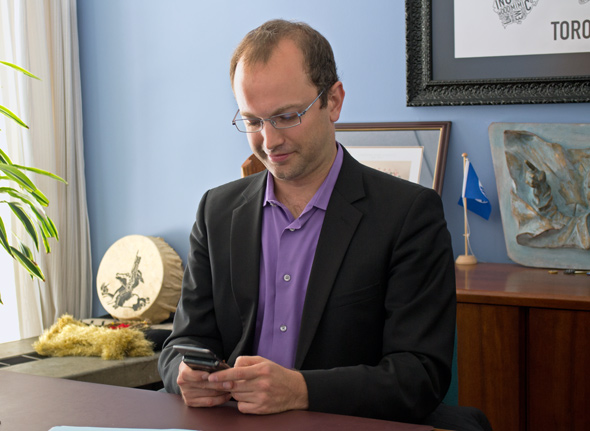
What can be improved as far as Toronto's green initiatives go?
We're still having difficulties with rolling out our diversion for our waste, which is unfortunate because it will cost us a lot in the end.
I think our problem globally is climate change. I think we're doing more than some cities with our green development standards and there are some good programs from the Toronto atmospheric fund that my dad helped to start.
The problem is that those programs are starting to come into question from the current administration even though they have proven returns financially for the city. This idea that the government shouldn't be in the business of promoting efficiency is starting to come out.
The feds have now canceled their eco energy homes program, which also means the province canceled it. So we are now working on a piece of policy that is similar to one in the U.S. It involves us giving home energy retrofit loans that the city facilitates. There's zero cost to the city and the tax payer, but massive savings can be accrued by the home owner. It creates thousands of jobs too.
You started your career as one of the youngest councilors. What was the biggest challenge you faced?
The biggest one was to differentiate myself from my father and stepmother.
Before I was a city councillor, I was an environmental activist. Before that I was a political activist, and before that I was getting my masters in urban planning. I spent a good number of years doing political work, but all the while being a community organizer, so my primary role was to bring stakeholders and different communities together to get them all working towards the same goal. That was and still is the role of good city council. They act as a catalyst.
So that's what is was from door number one that I had to knock on. And then, of course, when introducing myself, I'd always get the — "oh, you're Jack's son."
While I don't shy away from the fact that my politics are very similar to my father's, I bring something else to the table. It's an enthusiasm and experience through being that catalyst and that community organizer. Building that trust is difficult, as it is for most candidates. It's extremely difficult to get literature in everyone's hand, and so every conversation starts with this aspect of who I am.
In addition to the challenge of getting away from the initial question of "so, you are Jack's son?" — or more increasingly, Olivia's step son — my focus is on talking about the community we want to build and how can I be helpful in accomplishing that.
If you were mayor of Toronto tomorrow, what is the first policy decision you'd make?
We need to seriously look at revenue sources in our city. We need to provide more equity and fairness in how we raise our revenues. Not having a mechanism for raising funds from the usage of single passenger automobiles is a problem. We collect a significant amount of revenue from transit users, who also pay taxes. We don't from people in cars.
I am not convinced that just having a fee to get your license plate in the city is the most equitable way of doing it.
With more revenue tools, we could get more transit built. It would help the productivity of the city by lessening gridlock and it would make the city a more attractive place to live. It would attract more tourists to Toronto, which again would increase revenue.
Can you describe your relationship with Rob Ford
I think it's cordial, particularly, when it's just he and I. He was very generous with his praise of my father after his passing. He's always interested in how things are going personally. We can have those conversations privately in the halls.
We've collaborated on a couple of small pieces. There is some common ground that we can work together on, but there are a significant number of issues that we don't see eye to eye on. Although there seems to be some fireworks in the chamber, that doesn't carry over into the hallways. We have to work together for the next two years regardless of what happens. I think the idea is that you work together where you can, and where you disagree, you try to leave it upstairs in the chamber. That doesn't mean I'm not trying to organize a direct opposition to some of his policies. I will continue to do so, but it's not a personal thing.
My politics are based on a different set of values then his are.
RAPID FIRE QUESTIONS:
Where do you get your caffeine fix? I drink tea
Favourite place in the city for inspiration? The north shore Toronto Island. It has something to do with my childhood. The emotional connection puts me in a really good place.
Favourite Toronto building/landmark? The gates of Trinity Bellwoods park.
Favourite Subway station? Bathurst... It's the smell of the bakery. I grew up one block over, so it was my station. But it's really that bakery smell. I could be blindfolded and I would know exactly where I was.
Favourite restaurant? Banjara on Bloor. Best Indian place in the city. I've had community meetings there. I could eat it every single day. The menu and atmosphere are great.
Favourite street/trail to ride your bike? The Martin Goodman trail along the waterfront...it's gorgeous.
Latest Videos
Latest Videos
Join the conversation Load comments
